
Nasopharyngitis is a very common disease. Most often it affects children. The disease is characterized by inflammation of the nasopharyngeal mucosa. It is caused by viruses that infect the body with airborne droplets.
Nasopharyngitis develops on the background of weakened immunity, when the child has not fully recovered from the previous illness, and against the background of an already existing infection. It can be acute and chronic.
Contents
- 1 Symptoms of the disease
- 2 Forms of the disease
- 3 Treatment of the disease
- 3.1 Treatment of acute disease
- 3.2 Treatment of a chronic disease
- 4 Treatment from the point of view of Komarovsky
Symptoms of the disease
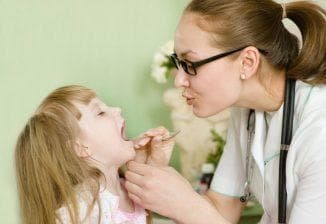
There are three stages of development of nasopharyngitis:
- At the initial stage, the child feels minor discomfort in the nasopharynx.
- Gradually there are serous discharge from the nose.
- The nature of the selections varies. They become serous-purulent.
Children suffer this disease much harder than adults. The general condition of the child's body worsens. There is lethargy, appetite disappears and sleep is disturbed. There are complaints of a headache and unpleasant sensations in the throat when swallowing.
All manifestations of nasopharyngitis can be divided into general and local. Common symptoms include fever and general weakness. They appear at the beginning.
Local signs develop when the disease has already reached the next stages of development. Epithelial cells are damaged, which causes severe swelling. This is accompanied by a sore throat when swallowing. To improve well-being in this case will help warm tea.
Nasopharynx swells because of what it seems that the nose is stuffed and it becomes difficult to breathe. A runny nose may appear. In some cases, lymph nodes increase.
Your child may have a cough that usually worries in the morning. This symptom does not occur due to damage to the lungs or bronchi. Cough develops as a reactive process and can be insignificant.
On video nasopharyngitis in children:
Clinical manifestations of nasopharyngitis in children develop gradually. The mild course of the disease may not even affect the child's well-being.
Children of infants react much worse to illness. Due to the fact that the nose is laid, they give up the chest, lose weight, there may be diarrhea. Therefore, such children need special attention.
Forms of the disease
There are acute and chronic forms of nasopharyngitis.
Children usually have acute nasopharyngitis. It can last for a week or two. In the first few days there are no signs of illness, in 3-5 days the clinical picture becomes more pronounced. If there are no complications, by the end of the second week the child recovers. 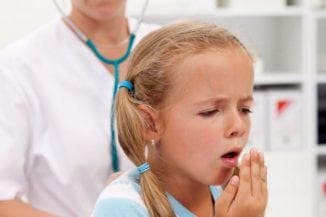
Chronic pharyngitis occurs if the child has weak immunity or a high risk of developing respiratory system pathologies.
If the duration of the disease is more than three weeks, there is reason to suspect a chronic process. In children, this form of nasopharyngitis occurs infrequently, since such changes in the nasopharynx need a lot of time. Therefore, if the disease lasts longer than usual, it is necessary to undergo a comprehensive examination.
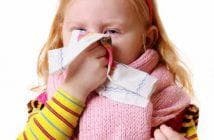 And here's how to use a children's Lazolvan for inhalations, this article will help you understand.
And here's how to use a children's Lazolvan for inhalations, this article will help you understand.
Which child antibiotic for cough and cold is most effective, and what is its name, is detailed in this article.
Which child syrup from a wet cough is the best, and also how to choose it correctly.detailed in this article: http: //prolor.ru/g/lechenie/ detskij-sirop-ot-kashlya-kakoj-luchshe.html
Which children's cough syrups from 2 years old are the most effective and safe, is very detailed in this article.
Treatment of
diseaseTherapy of nasopharyngitis is aimed at eliminating the symptoms and improving the child's well-being. It is desirable to begin treatment as soon as possible. This will avoid complications.
When nasopharyngitis, the child is shown bed rest. It is necessary to pay special attention to nutrition. The amount of protein in the diet should be increased, and fat and simple carbohydrates reduced. The food should be a warm, puree-like consistency. This will avoid irritation of the affected throat.
An important part of the treatment is the drinking regime. A child should drink a lot. This will speed up the process of removing the virus from the body. You can drink loose tea, fruit drinks, compotes.
The body needs more vitamins. It is better if the child receives them in the form of fruits and vegetables.
On video, how to treat nasopharyngitis in children:
Treatment of acute disease
In acute nasopharyngitis, the following procedures are prescribed:
- At the beginning of the disease, put mustard, make foot baths and conduct other thermal manipulation.
- Vessoconstrictive drops are used.
- In the presence of purulent discharge from the nose, prescribe local antibiotics, which need to drip into the nose.
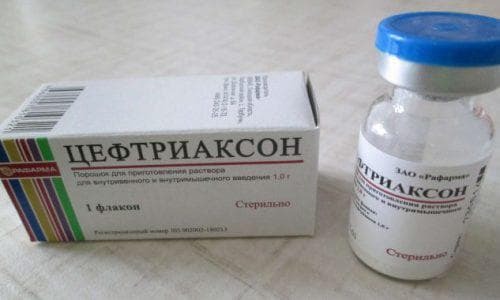
In the photo-local antibiotics
- In the viral nature of the disease, antiviral drugs are needed.
- Positive effect of washing the nose with herbal decoctions, mineral or sea water, Furacilin.
- Physiotherapy procedures, such as UHF and ultrasound of the nose, may be needed.
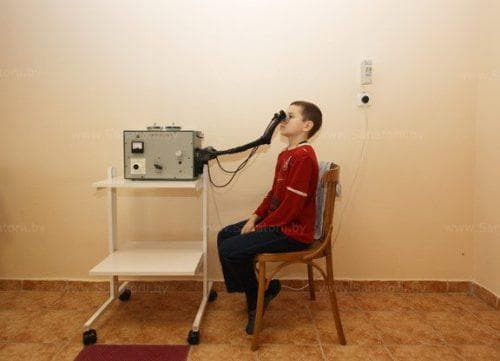
On the photo of the child
Therapy of the chronic disease
After confirming the diagnosis by a specialist, prescribe such measures for chronic nasopharyngitis:
- Gentle diet. It is necessary to refuse hot, sharp, salty.
- Irrigating the throat with antiseptic drugs, such as Chlorophyllipt, Tantum Verde.
- For local use, antiseptic sprays, lozenges, and dissolving tablets are prescribed.
- In order to restore the ability to breathe normally, such procedures as adenotomy, submucosal resection of the nasal septum can be prescribed.
- If necessary, can use antibacterial drugs and physiotherapy treatment.
Which child syrup from a wet cough is the most effective, and what is its name, will help to understand this article.
But what is the price of children's drops in the nose Derinat, and in what case is it worth using them.detailed in the content of this article.
You may also be interested in knowing when to use a children's ultrasound inhaler.
Treatment from the point of view of Komarovsky
Dr. Komarovsky argues that an important part of the therapy of nasopharyngitis is the correctness of determining the causative agent of the disease. He insists that it is necessary to take a smear from the pharynx to the microflora and a clinical blood test.
Only after receiving the results of these tests can an adequate treatment be prescribed, which consists of such measures:
- Vitamin C. Use
- The use of medicinal plants such as echinacea, yellow-root Canadian. They well suppress the infection.
- Homoeopathic medications prescribed by a doctor are also used.
- Hydrotherapy is carried out: soak a piece of tissue in hot water and apply for a few minutes to the throat, then for a while apply a cloth soaked in cold water. But how does rinse with chlorophyllipt in angina, and how effective is this drug.will help to understand this information.
- In some cases, antibiotics are prescribed.
On video-acute nasopharyngitis in children:
In chronic nasopharyngitis, it is necessary to carry out such recommendations:
- After each meal, gargle with antiseptic solutions based on medicinal plants.
- Soak throat with antibiotic sprays.
- Take antibiotics inside if there is evidence for this.
- Use antiseptic lozenges. The child must completely dissolve them.
It is very important that in case of chronic nasopharyngitis the child be provided with special conditions:
- Ensure that the humidity level is normal and regularly ventilate the room.(but how it is necessary to do inhalations with saline with a wet cough, very detailed in this article)
- More time to spend in the fresh air.
- Ensure that the child does not breathe dust or tobacco smoke.
Dr. Komarovsky says that it is very important to pay special attention to the prevention of the disease.
The child should be taught to comply with hygiene rules, if the illness occurs in someone from the next of kin, contact should be limited, teach the child to cover his mouth when he sneezes or coughs, the sick child should not go to the kindergarten or school until full recovery.
It is almost impossible to completely prevent infection with viral infections. But timely treatment and compliance with all prescriptions of the doctor will help to avoid serious complications.
